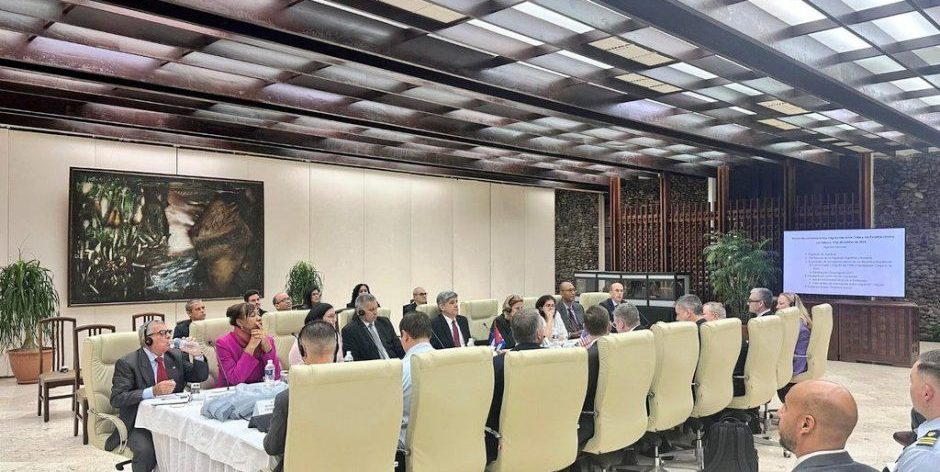
Round of bilateral talks on migration between Cuba and the United States, December 4, 2024.
Havana, December 5 (RHC)-- Cuba has expressed its willingness to consolidate and expand bilateral cooperation on migration with the United States. This was stated by Deputy Foreign Minister Carlos Fernández de Cossío in statements to the press at the conclusion of a round of bilateral talks on this issue, in Havana.
Fernández de Cossío added that the round of migration talks held this Wednesday responds to the mutual commitment to try to ensure that migration between Cuba and the United States is safe, orderly and regular.
“We can describe the dialogue that took place today as constructive and frank. We attach great importance to this type of exchange and to the cooperation that should result from it,” he said.
The deputy minister pointed out that “in the dialogue Cuba reiterated its willingness to comply with the commitments it has assumed and demands a similar commitment from the United States in the fulfillment of the agreements.”
He affirmed that these “are comprehensive agreements, which are fulfilled on the basis of reciprocity. Therefore, in terms of migration, we will act in reciprocity and in accordance with the way in which the United States complies with the commitments it has assumed.”
Fernández de Cossío reiterated that “the migration issue has a fundamental contradiction with the agreements we signed.”
In this regard, he argued that Cubans who have left or are currently leaving for the United States “are motivated by two fundamental reasons: the privileged treatment that the United States has always given to any Cuban who intends to enter that country by any means, whether regular or irregular, which is called a pull factor, and a push factor, which is a policy of economic blockade aimed at depressing the living standards of Cubans living in Cuba.”
The deputy foreign minister reaffirmed that “this combination of factors poses a fundamental contradiction with the purposes of these agreements and the mutual commitment to guarantee that migration is regular, orderly and safe.”
“During today's round, Cuba insisted on the need to fully resume the provision of consular services at the United States embassy in Havana for those requesting non-immigrant visas, which, although it was partially resumed in August for certain categories, has not yet recovered the level it had before.
“We have argued that this is a factor that encourages many people to want to emigrate to obtain residency and travel between the two countries, something that would not be necessary if there were multiple visas and if citizens who visit were processed from Havana,” said Fernández de Cossío.
He added that “Cuba raised concerns about the number of Cubans who are in the United States in a legal limbo, who have been allowed to enter the North American country but have not been granted a concrete legal status. For us, that is an important issue.”
Another issue addressed by the parties, according to the vice minister, was “the growth of human trafficking operations from means that come from the United States, individuals or organizations that operate from the south of that country and participate in human trafficking with operations that go against the law.
“We point out the aggressive treatment that has been occurring for several months in American airports against Cubans who reside in Cuba, Cubans who reside in the United States or in third countries when they travel to the United States,” he added.
“We believe that for two countries like Cuba and the United States, with a geographical proximity and a considerable flow of travelers, plus a large presence of Cubans in North American territory, it is important that both governments maintain cooperation on migration issues,” the vice minister stressed.
The deputy minister of Foreign Affairs Carlos Fernández de Cossío offered statements to the press today at the conclusion of a round of bilateral talks on migration issues between Cuba and the United States.
Regarding the statements that the incoming U.S. administration has made about possible mass deportations, the deputy foreign minister said that it was not a term addressed during Wednesday's round of talks.

